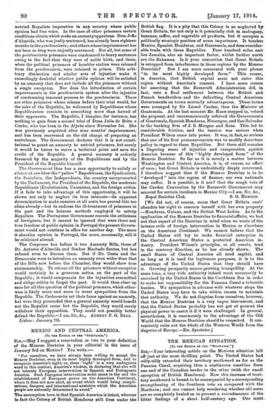MEXICO AND CENTRAL AMERICA.
[To run Ernes or raw "Brectrrox."1
Sra,—May I suggest a reservation or two to your definition of the Monroe Doctrine in your editorial in the issue of January 3rd on Mexico P You write :—
"For ourselves, we have always been willing to accept the Monroe Doctrine, even in its most highly developed form, and to recognize America's right, or, Shire 'right' is a very ambiguous word in this context, America's wisdom, in declaring that she will not tolerate European intervention in Spanish and Portuguese America. Such European intervention must mean in the end the establishment of European power on the American Continent, where it does not now exist, an event which would bring compli- cations, dangers, and international anxieties which the American people are naturally determined to avoid."
The assumption here is that Spanish America is intact, whereas in fact the Colony of British Honduras still lives under the British flag. It is a pity that this Colony is so neglected by Great Britain, for not only is it potentially rich in mahogany,' bananas, coffee, and vegetable oil products, but it occupies a politically strategic position of some importance. It touches Mexico, Spanish Honduras, and Guatemala, and does consider- able trade with these Republics. Four hundred miles each lies Jamaica, also an important factor, whilst further north are the Bahamas. Is it your contention that Great Britain is estopped from interference in these regions by the Monroe Doctrine? But I am more concerned with your phrase "in its most highly developed form." This means, in America, that British capital must not enter this region without America's consent. I have some reason for asserting that the Roosevelt Administration did, in fact, veto a final settlement between the British and French bondholders and the defaulting Central American Governments on terms mutually advantageous. These terms were arranged by Sir Lionel Carden, then the Minister at Guatemala. At the last moment Mr. Knox stepped in, vetoed the proposal, and unceremoniously referred the Governments of Guatemala, Spanish Honduras, Nicaragua, and San Salvador to the banking firm of J. S. Morgan and Sons. This led to considerable friction, and the tension was serious when President Wilson came into power. It was, in fact, so serious that one of his first pronouncements was to modify American policy in regard to these Republics. But there still remains a lingering sense of injustice and exasperation against America because of this "highly developed form" of the Monroe Doctrine. So far as it is merely a matter between Washington and Central America, it is, of course, no affair of ours ; but Great Britain is undoubtedly deeply concerned. I therefore suggest that if the Monroe Doctrine is to be " developed " into the region of finance, our own nationals may suffer. It is possible, is it note that the rough veto of the Carden Convention by the Roosevelt Government may account for certain incidents in Mexico City.—I am, Sir, &c., Royal Societies Club. S. G. HOBSON. [We did not, of course, mean that Great Britain coule abandon her right to concern herself with her own property —Honduras, Guiana, and the British West Indies. As to the application of the Monroe Doctrine to financial affairs, we had not that aspect of the Doctrine in mind when we wrote of the intense evils of foreign intervention in Mexico or elsewhere on the American Continent. We cannot believe that the United States will try to make financial enterprise in the Central American States a protected American in- dustry. President Wilson's principles, at all events, tend in the contrary direction, as be has already shown. The small States of Central America all need capital, and so long as it is used for legitimate purposes, it is to the advantage of the United States that they should have it. Growing prosperity means growing tranquillity. At the same time, a very wide authority indeed must necessarily he exercised by the United States in the Caribbean Sea in order to make her responsibility for the Panama Canal a tolerable burden. We sympathize in advance with whatever steps the United States may have to take within reason to maintain that authority. We do not disguise from ourselves, however, that the Monroe Doctrine is a very vague instrument, and that the United States probably has not got at present the physical power to assert it if it were challenged. In general, nevertheless, it is enormously to the advantage of the Old World that the Monroe Doctrine should be respected. It con-. veniently rules out the whole of the Western World from the disputes of Europe.—En. Spectator.'










































 Previous page
Previous page